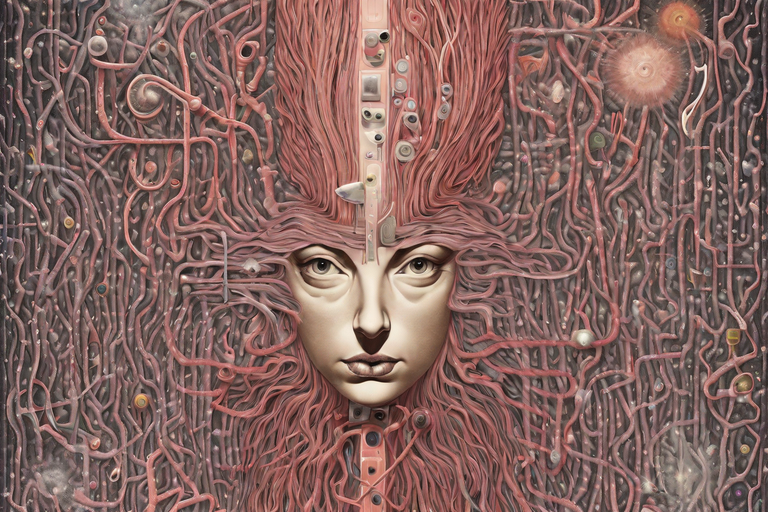We like our thoughts. Which is to say, we can’t bear to let go of them. We simply can’t bring ourselves to let go of them – even if we feel sometimes that we really want to. It could be said that our thoughts comfort us in some way, it could be said that they comfort us with their familiarity. Even the tiresome or troublesome thoughts comfort us with their familiarity. Thoughts are always familiar; they always bring a sense of familiarity with them because they always reflect back our own assumptions to ourselves. There is no such thing as a thought which is not a reflection of the assumptions that we have made without knowing that we have, the assumptions we have made and yet do not know anything about. Thoughts are confirmation, in other words – they are confirmation of our invisible biases.
Sometimes we are afflicted by thoughts that are not just tiresome or troubling in some relatively trivial way, but troubling in a very great way. Sometimes our thoughts completely undermine us and cause us unrelenting suffering on a long-term basis and in this case we may seek therapy of some kind to help us do something about the suffering-producing thoughts. We would of course like to be entirely rid of them. No matter how much pain our thoughts are causing us however, it is highly unlikely that we would want to be rid of all of them. It is very unlikely that we would see that all of our thoughts are suffering-producing, and have the same relationship with all of them for this reason (instead of having preferences). We persist in thinking that we can pick and choose so that we can have the thoughts we enjoy or find useful, and not have the other ones.
Thought is ‘all the one system’ however and the pain-producing thoughts always balance out the pleasure-producing ones. To welcome pleasure is to welcome pain; to be in the market for hopeful anticipation is also to be in the market for bitter disappointment. To want praise is to want condemnation. Thought is a sword with two sharp edges to it and it can cut equally well both ways. Whilst thinking activity is natural and we don’t have to try to ‘do something about it’ it is also true that the way we are with our thoughts determines how they are with us. If I need my thoughts because they provide me with ‘the sense of the familiar’ that I want so much, then the ‘thinking mind’ is going to become controlling towards me. Where there is need there is going to be ‘the exploitation of that need’; if I want security then this is the same as saying that I want to be controlled because it is by having my reality defined for myself that I get to feel secure. There is no other way to do it.
So although thinking activity is perfectly natural and not something we should wish to do away with, it is also true that when we are ‘fond’ of our thoughts because we like the sense of security or sense of familiarity which they provide us with we are inevitably going to be controlled (or determined) by them. The thoughts are fine in themselves and they don’t need to be eliminated but when we are fond of them in this way then they will control us and this – we might say – is not ‘fine’. It’s not fine because this just isn’t going to work out for us. It can be said that being controlled by our thinking whilst imagining that we are controlling it is perfectly ‘natural’ too of course, and for sure trying to do something about this situation by force is supremely useless (since we obey thought by thinking that we are fighting against it) but at the same time we wouldn’t want this situation for ourselves or anyone else because it is suffering. It is ‘natural suffering’ but suffering isn’t ‘an end in itself’ – when we suffer from the restricted existence that thought bestows upon us this is teaching us something about thought! It is quite natural to move in the direction of being ever-more imprisoned by our thoughts and that is the direction our rational always decisions take us, but there is also another tendency that arises here and that is the more essential tendency to move away from the security-seeking behaviours that imprison and deplete us and reclaim our autonomy.
This doesn’t mean ‘getting rid of our thinking,’ as we have already said, but what it does mean is that we learn to stop being so stubbornly risk-averse with regard to losing our sense of ontological security; what it means is we become more adventurous and as a result less ‘inviting’ towards the dire situation where we are always being controlled or determined by thought. We’re not in the market for being controlled because we no longer in the market for security. The thoughts may still be there because we don’t need them in this way that we are not aware of; our relationship with them has changed profoundly – in a nutshell, we are no longer in the position where we have to automatically believe what our thoughts tell us. This is the crux of the matter – when all they really do need care about his security then this translates into ‘utter gullibility with regard to whatever thought tells me’. If my thinking tells me that I’m happy then I’m happy and if it tells me that I’m sad then I’m sad; if it tells me that I am this thing then I believe it but if it tells me to that I am that thing then I believe that instead. The bottom-line is that unless I believe in the world that thought is created for me then I won’t be able to get any ‘security’ out of it.
What is exactly a thought when it doesn’t tell us what to feel, or what to be? What is a thought that doesn’t determine our reality, a thought that we don’t automatically believe in? When a thought is not some kind of external factor acting upon us to determine how we perceive reality then it isn’t very much at all! A thought that has no power to hypnotise is of course a very different thing from a thought that does have power over us in this way – between the one situation and the other was a world of difference. In the first case there is freedom and in the second case there is none! This brings us back to what we were saying earlier, which is that the arrangements are not having any existential freedom (so that will in other words the situation where we are being told who we are and what life is all about) suit us very well indeed since the freedom of not being told who or what we are something that we don’t really want! ‘It is always the same: once you are liberated, you are forced to ask who you are.’ says Jean Baudrillard.
This is our dilemma therefore: our thinking is creating suffering for us but we have to put up with it since it is the only thing that is protecting us from freedom. In order to be free from this suffering we would have to be ‘free’ in an unqualified way and that is precisely what we don’t want. We don’t want to be free because we know (in some way) that to be free is not to be who we thought we were. To ‘not be who we thought we were’ is the same as ‘not being’ as far as we’re concerned (since all we believe in is our thoughts) and since our (apparent) existence is the most important thing in the world to us we will resist the cessation of our apparent existence to the very limit of our ability. We will resist what absolutely feels like the threat of non-existence to the very best of our ability, in other words; the thought of this threat materialising is of course our greatest fear. We can talk about our ‘need’ for ontological security (or our need for this basic sense of familiarity about things) but when it comes down to it what we are talking about here is nothing other than the fear of dying. Although we don’t consciously put the two things together (the loss of the positive environment that is created by our thoughts and the loss or extinction of who we think we are) we do nevertheless understand on some deep level that they are one of the same thing and we react accordingly – we cling to our thoughts no matter what the price for that cleaning might be.
The ‘dilemma’ is therefore that no matter how hard our thinking makes life for us we are never going to sincerely consider ‘the radical option’ of cutting out our dependency on thought. This isn’t exactly a hard idea to understand of course; we all grasp this principle as it applies to relationships and it is no different here – the co-dependent or abusive relationship necessarily destroys our belief in our own autonomy making it all but impossible to leave. Walking out of the co-dependent relationship that we have with our thinking doesn’t mean getting rid of all of our thoughts, as we have said, it simply means not having to think all the time (i.e. not being dependent on thought’s secret function of affirming and reaffirming the reality of the everyday self). Just as long as we very strongly feel ourselves to be that self (and are afraid of any other type of feeling that we might possibly have) then ‘independent existence’ is just a pipe dream. We have become a mere ‘appendage of thought’ and so when the thinking mind becomes ‘abusive’ towards us we just have to put up with that treatment; we need thought too much to really ‘do anything about it’, and so this is the hook we get hung up on.
Going back to this quote of Baudrillard’s, we could say that what we fear the most is the situation where we have to ‘ask who we are’ and because we are in such terror of having to ask this question we are stuck with being who the thinking mind says we are! Sometimes who the thinking mind ‘says we are’ seems great to us (i.e. when we have a ‘euphoric self-image’) and in this case we certainly don’t want to realise that our apparent identity is a fraud. Why question success, after all? Why question what (superficially, at least) seems to be a good thing? But when thought shifts gears and start working on it in a different way so as to tell us that we are a rotten person, a useless worthless person, a bad or even evil person, we still aren’t incentivised to give up our addiction to the thinking habit entirely, once and for all. We don’t want to give up all the thinking, just the thinking we don’t like. We want the complementary or flattering label but not the derogatory, belittling one. If we aren’t being told who we are by the bully of a rational thought what will happen to us then? Better a derogatory label than no label at all (or so our unconscious/unexamined logic goes), since ‘having no label at all’ seems very much to us to mean that we no longer get to exist.
We ‘want the label’ therefore – to put it crudely – and that’s the beginning and the end of it. Having a label is synonymous with existing for us, but this is a very perverse form of ‘existing’; when we have been ‘told who we are’ by some external authority (when we have been made the subject of a literal narrative) then our situation is ‘perfectly inverted’, although we can’t see this at the time. Our freedom lies in the direction that is the exact opposite to our will and so everything we do is ‘against ourselves’. What makes sense to us is the very thing that takes us away from freedom and moving away from freedom is to incur an ever greater degree of suffering; our own way of looking at things acts against us therefore, which is why the alchemists spoke of their discipline as ‘the work against nature’, or ‘opus contra naturam’. When we go along with our conditioned nature then we always end up imprisoning ourselves, even though this is the last thing we actually want to do. We can understand this in terms of risk. Existential risk is the thing we most want to avoid or eliminate, and yet at the same time it is our ‘gateway’ to reality itself. There is no other gateway.
The principle here is, ‘the more you risk, the more you are and the less you rest, the less you are‘. Our natural tendency is to turn our backs on risk; we actually make a whole big project of this and we call that project ‘our lives’. To be defined (or ‘narrated’) by the thinking mind is the situation of ‘maximum-security’ or zero risk’ and this is – as we keep saying – the way we like it; the less we are reliant on thought to define or narrate us the more we are ‘risking’ and so the less ‘security’ we are going to have in that situation. The less risk we take the more we believe ourselves to be ‘who or what our thoughts tell us we are’ and the less we partake in actual reality as a result. It’s not that we experience an impoverishment of our environment or a degrading of our situation but that we ourselves are that impoverishment, as Jesus says in the Gospel of Thomas. That’s why we can’t see our impoverishment. When we ‘risk’ not being defined, not being told who we are, then we are risking finding out that we are not who or what we have been told we are. That is the risk we don’t want to run. That is why Alan Watts speaks of ‘the taboo against knowing who we are’ (although the way we are speaking of it here is more in terms of ‘the taboo against finding out that we aren’t who thought says we are’). It is this risk that we are running away from for all we are worth, therefore; this is what we fear, without ever admitting to ourselves that this fear even exists.
From our habitual point of view this ‘risk’ is a very bad thing, the very worst sort of thing, a total catastrophe in fact. What we are actually risking here is ‘finding out the truth,’ however and this is what we perceive invertedly as being ‘a very bad thing’. But why should seeing the truth be ‘a very bad thing’, a ‘disaster’, a ‘total catastrophe’ that we have to run away from? What kind of situation is this? How could not being convinced of a lie (i.e. not being convinced that ‘we are what we aren’t’) be such a terrible disaster? Why do we prefer being deluded, never finding out who we are? The answer is that this is how things seem from the inverted viewpoint, the viewpoint that is the antithesis of who we really are. From the inverted viewpoint we see everything backwards. The prisoner’s dilemma is that everything the prisoner does in order not to be a prisoner simply reinforces this unfree situation. The invisible glitch is that we aren’t ‘the prisoner’ at all – we just think that we are…
Image – adventure.com






